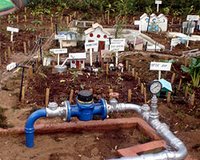Chuks Oluigbo writes:
In order to participate as equal partners in the globalization process and reap fully the fruits of globalization, Nigeria and the rest of the Third World must, as a matter of urgency, aspire towards self-sustenance and –sufficiency by developing indigenous technology, diversifying their economies, reducing importation and conversely encouraging the emergence of local industries, limiting the activities of the multinationals through strict regulations, searching for alternative roads to development where the capitalist mode of production has failed to produce results














